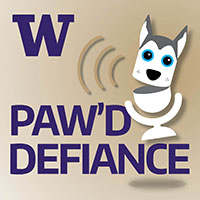
Misinformation & COVID-19
Jevin West from UW's Center for an Informed Public talks about misinformation, conspiracy theories and reliable sources on the latest episode of Paw'd Defiance.
What do burning 5G towers have to do with the cornonavirus? Well, as it turns out, a conspiracy theory making the rounds on the internet and social media makes a link between 5G technology and the disease. “Conspiracy theories about 5G have been around for a while,” said Jevin West, director of the University of Washington’s Center for an informed Public (CIP). “This latest derivation suggests 5G maybe weakens the immune system or is the root of the virus.”
In the past few months arsonists have set fire to dozens of 5G towers across Europe. These acts underscore the need for accurate and reliable information. But what does that even mean? We live in an age where almost anyone can create and distribute content. Professional news outlets employ factcheckers and copyeditors to ensure what goes out is factual, but even they get it wrong from time to time. There seems to be an infinite number of websites that purport to publish news. Some are familiar, most are not.
The media landscape is crowded and noisy. Finding the “truth” can be difficult and often times feels impossible. Enter West and the team at the CIP. The center’s mission is to, “resist strategic misinformation, promote an informed society, and strengthen democratic discourse.” This is achieved through research into who creates misinformation and examining how it spreads and why.
West talked about misinformation, specifically within the context of our current public health crisis, on the UW Tacoma podcast Paw’d Defiance. The Q&A below is an excerpt. You can listen to the full interview on the podcast.
Eric Wilson-Edge: We’re in the middle of a pandemic, but we’re also in the middle of what the World Health Organization calls an “infodemic.” It’s this idea that we have so much coming at us that we can’t sort out fact from fiction. Is this a function of how little we know about the virus or is this because of the technology we have that makes it easy to disseminate information? Is it both?
Jevin West: I think it’s a little bit of both. There’s a ton of uncertainty right now tied to this event. If you looked at something like 9/11, it happened quickly. The world basically changed in a day and the world with this pandemic is changing, but it’s changing over a longer period of time and people want answers.
Wilson-Edge: Do we know why someone creates or maybe spreads misinformation? Is it deliberate?
West: Many of the rumors, especially during crisis events are spread with no malintent. What you see is people are trying to make sense of what’s happening and over time the information mutates and gets distorted like the game of telephone you played as a kid. Also, there are individuals out there that are purposely trying to misinform and there are two categories they fall under. Some are opportunists who are trying to make money and some propogandists who are pushing a specific narrative or who want to muddy the waters.
About Paw’d Defiance

The title of our show is more than just a clever play on words. The name reflects a philosophy, one that is committed to telling interesting stories about the people, research, initiatives, community partnerships and other issues related to UW Tacoma and higher education. It also speaks to our interest in the greater Tacoma community. Point Defiance is inexorably linked to the Grit City. Also, “defiance” is a fun word and, either intentionally or not, speaks to Tacoma's history as the “other” city in the Puget Sound region.
Thank you to Doug Mackey at Moon Yard Recording Studio for his recording support and Senior Lecturer Nicole Blair for our theme music. The first season of this podcast was made possible by funding from the UW Tacoma Strategic Initiative Fund.
You can find Paw'd Defiance on iTunes, Stitcher, Google Podcasts, Pocket Casts and Spotify. You can also click here to listen: Paw'd Defiance



